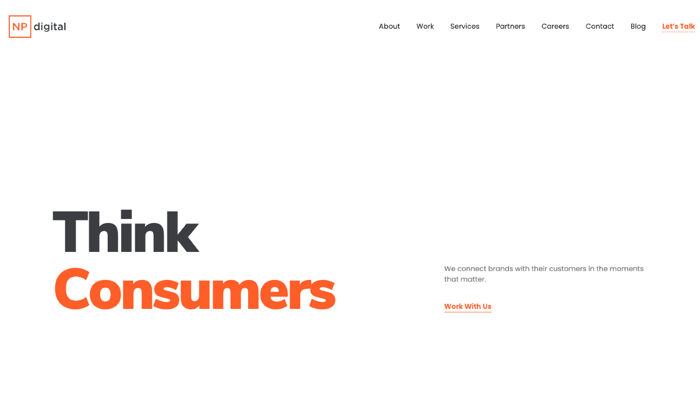
As an industry, ecommerce is expected to grow at a minimum of 6.3 percent per year. According to Statista, user penetration will be 82.2 percent by 2024, up from 77.3 percent in 2020. The retail apocalypse and a worldwide pandemic have boosted ecommerce growth.
This is good news for ecommerce companies; it’s great news for ecommerce companies with an agency that’s ready to take advantage of this growth.
Here’s what you need to choose the right ecommerce agency.
Know Your Goals and Desired Outcomes
With ecommerce, the goals and desired outcomes are pretty straightforward. You need to sell products to make money. Your agency’s approach should be geared toward direct response marketing. You send customers a relevant message that’s designed to get them to do something — learn, subscribe, follow, or buy.
Here are a few simple goals you can use as a starting point with your agency.
- Increase qualified website traffic
- Increase time on site
- Add more subscribers to your email list
- Add followers to your social media accounts
- Increase sales
- Increase upsells
- Increase average order values
- Decrease expenses and marketing costs
- Improve customer retention
These goals should be oriented around specific outcomes, regardless of the goals you choose. Examples of outcomes include:
- Increasing return on ad spend by 13 percent
- Boosting website traffic by 26 percent
- Increasing year-over-year sales by 30 percent
- 2x product upsells
- Add 125K more subscribers in 18 months
Each of these examples should be focused on producing a specific result or outcome for your business. If you provide your agency with specific goals, they should be able to provide you with a plan to achieve those goals.
4 Characteristics That Make a Great Ecommerce Agency
While choosing the right ecommerce agency isn’t rocket science, it does require the right information and a bit of discipline. If you know what you’re looking for, it’s easier to screen for it.
1. Experience and knowledge of your business
Your industry has its own ethnographics — its own culture, unique jargon, and problems. Your agency should have the industry experience you need to work with your customers, your business, and the industry successfully.
If your product lines are broad or you have a lot of products that you offer, you may be able to work with agencies with a broad or generalized skill set. If you’re a specialist or your industry is highly technical, it’s really important that you choose an agency with subject-matter experts who understand your business well.
If your agency has this know-how, they’ll have what they need to promote your business effectively. They’ll know which images work best; their writers will understand the tone and voice they should use in your content. They’ll have a pretty good idea of the promotions your customers will respond to.
2. They put customers first
Your agency should treat your customers as the priority. They obviously mean that they work to get to know your customers as well as you do. This isn’t just an understanding of the things your customers want and need. It’s an understanding of the way you work with your customers.
This is important because your agency needs to be able to say no if they see something that could affect customers negatively.
This is essential because it means you can trust your agency to always do what’s best for your customers and your business. This also means your agency will be focused on managing your budget well, so they’re able to generate results for you.
For example, if your agency knows your breakeven cost, and they understand your margins, they’ll avoid creating ads with offers that create a financial loss. If your margins are tight, they should avoid customer discounts, choosing to focus on backend incentives (e.g., low price guarantees, bonuses, and warranties) to attract more customers.
3. They prioritize revenue and returns
Everything your agency does should lead to revenue. Their work should generate leads, sales, and revenue consistently for your business. Your agency should help you find ways to cut costs, specifically in high-cost areas like shipping or returns.
They should be able to show you a process they can follow to increase your return on marketing investment and lower advertising costs. This sounds like it’s pretty obvious advice, but you’d be surprised at the number of agencies that ignore this. Some agencies prefer to be vague about things like revenue and returns so it’s easy to collect their monthly fee.
4. Focus on the right metrics and KPIs
There are lots of ecommerce metrics you can track, your agency should be able to identify the core metrics you need to grow your ecommerce business. If you decide that you need more data, you can always add more metrics on an as-needed basis.
Core metrics your agency needs to focus on:
- Website traffic rates: You’ll want to identify the traffic sources that make you money, sources that cost you money, and the sources that lead to increased conversion rates over time. If the traffic you receive generates interest from qualified customers, your source is good. If your agency continues to use CRO procedures, you should be able to increase your traffic at a lower cost over time.
- Email opt-ins: Email marketing is still one of the most valuable marketing channels you can use, producing an ROI of $42 for every $1 spent. Building an email list means you’re converting paid or earned media to owned media. Your agency should be focused on building email as a marketing channel, using it to stabilize your cash flow and revenue.
- Sales conversion rates: The average ecommerce conversion rate is 2 to 4.9 percent in the United States. Your agency, with consistent testing, should be able to increase your conversion rates year-over-year. Your agency should also be tracking both micro and macro conversion rates.
- Average order values: This tracks the dollar amount spent by your customers each time an order is placed on your website. Your agency should be able to provide you with concrete steps you can take to increase your average order values (and customer lifetime values) over time. They should help you create upsell, down-sell, and cross-sell opportunities. You should always have a list of tactics you can use to increase your average order values.
- Return rates: Returns cost ecommerce companies more than $550 billion. While brick and mortar return rates average around 8 to 10 percent, ecommerce return rates are more than double at 20 percent or more. Your agency should be able to help you lower your return rates. This is tough to do because 41 percent of customers buy products with the intention of returning some or all of their items.
- Ecommerce churn rate: Churn measures customer attrition; this is a problem for ecommerce. How do you measure churn rates if your customer never cancels? Your agency should be able to use metrics like repeat purchase rate or time between orders to calculate your churn rate and provide you with a plan to reduce churn in the future.
The ecommerce agency you choose should be able to provide you with clear answers about each of these. It should be clear that they have these characteristics and the ability to produce the results you need.
How to Work With an Ecommerce Agency
Your ecommerce agency should provide you with the information you need to evaluate their capabilities. You’ll want to ask for this information upfront.
- A proven track record: Your agency should be able to provide you with samples, references, case studies, and reviews to document their performance. If you found your agency through SEO, it’s a good indication that they understand SEO, and they’re capable of producing results for your business.
- Clear expertise: Your agency should be able to provide you with samples, case studies, and a proven track record, showing that they have the knowledge and experience needed to sell your products well.
- Clear milestones showing progress: You should be given a clear timeline, showing you how to approach your campaign, how long it will take to get everything done, and when they expect that you’ll start seeing results.
- A list of their credentials: Ask your agency for a list of certifications or credentials that communicate expertise, if they have any. This will verify their experience and knowledge in several areas. For example, if they’re a Premier Google Partner, you know that they have a specific amount of clients, revenue, and some financial stability.
- Agency people and procedures: Your agency needs to show you how they plan on approaching your campaign or project. Ask them to outline their process, show how they’ll manage your budgets, and how they’ll manage their people. You should know who’s assigned to your account and their backgrounds.
- Communication guidelines: When and how will their team communicate with you. Who will be your point-of-contact? Are you free to call your point of contact whenever you need help, or is there a specific time they’re available? Is support included (it should be).
Your agency should provide you with detailed specifics for each of these points. If you have more questions or concerns, you’ll want to bring those up with your agency.
The 6 Top Ecommerce Agencies
Here’s a list of the best ecommerce agencies in the industry today.
1. NP Digital – Best for Maximizing ROI

NP Digital is my e-commerce marketing company. One thing that sets my agency apart from other agencies is our direct response focus. Every improvement we make needs to lead to revenue in some way. If we’re optimizing images, rewriting copy, or redesigning graphics, it needs to make money for clients or produce results in a meaningful way.
2. Upgrow – Best for Strategic Planning
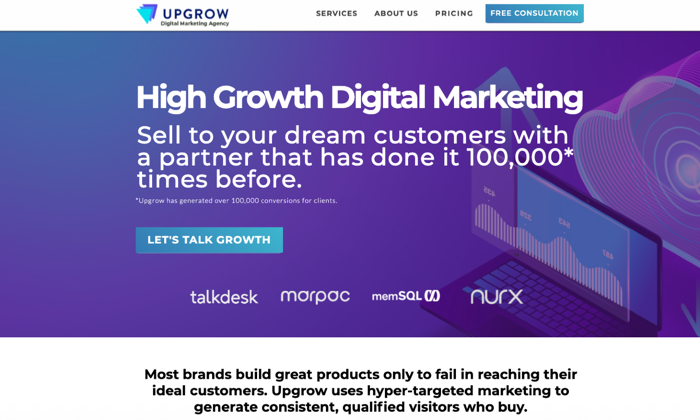
Upgrow is an e-commerce marketing agency that provides complete A-to-Z coverage and optimization. They can design, create, optimize, and promote your e-commerce business. As an agency, they’re expert generalists. They’re comfortable working with e-commerce clients regardless of their industry, whether they’re selling $1 pencils or five-figure consulting.
3. Inflow – Best for Ecommerce Specialist
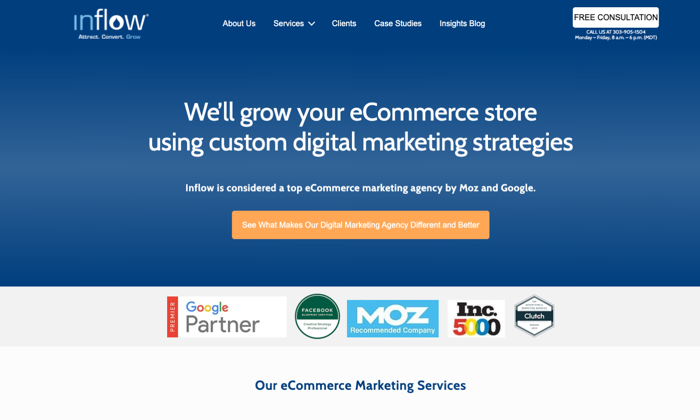
Most agencies provide A-to-Z support over several areas — design, optimization, and promotion; Inflow goes in the opposite direction focusing exclusively on the marketing and advertising side. They offer SEO, PPC, paid social, and CRO services.
Here’s one thing that sets Inflow apart is the fact that they don’t have account managers; clients work directly with industry veterans. If there are any questions or concerns about your campaign, you’re able to discuss the details directly with those working on your account.
4. Single Grain – Best for a Custom Marketing Plan
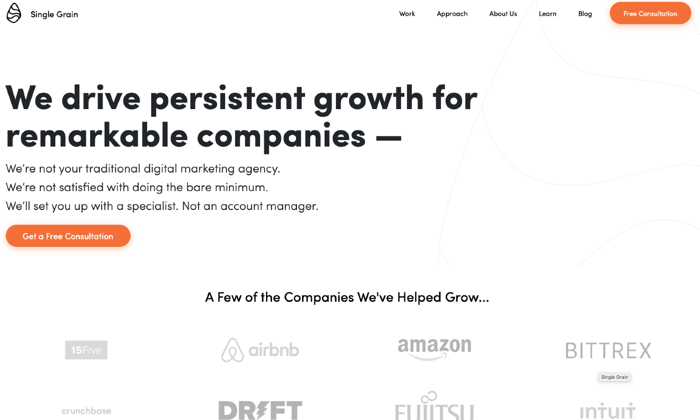
Single Grain focuses on rapid growth; every client receives a unique digital marketing campaign. Single Grain creates custom strategies on a case-by-case basis. This is important because many ecommerce marketing companies apply cookie-cutter techniques to ecommerce marketing.
5. 1Digital – Best for Bigcommerce Customization
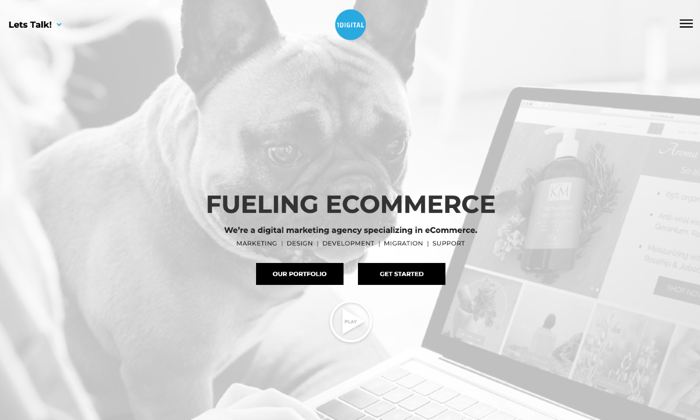
1Digital works with several ecommerce platforms, including Shopify, Magento, Volusion, and Woo Commerce; They’re known for their work with BigCommerce and Shopify. Like other agencies, 1Digital is a full-service agency that provides A to Z services.
6. Avex – Best for Shopify Plus

Avex is a boutique creative e-commerce agency that’s focused on brands in the beauty, luxury, lifestyle, and fashion industries. They focus primarily on optimizing for Shopify’s platform. They prioritize the creative and design side of marketing, which makes sense based on the industries they serve.
Conclusion
The ecommerce industry will continue to grow as more and more people shift their offline dollars online. This is a huge opportunity for ecommerce retailers. It’s also going to be a challenge for the businesses that are unprepared for the competition that follows.
Choose the right agency, and you’ll have the support you need to jump ahead of your competitors. Use this guide to find the pros and cons you need to vet the right ecommerce agency.
The post How to Choose The Right Ecommerce Agency appeared first on Neil Patel.